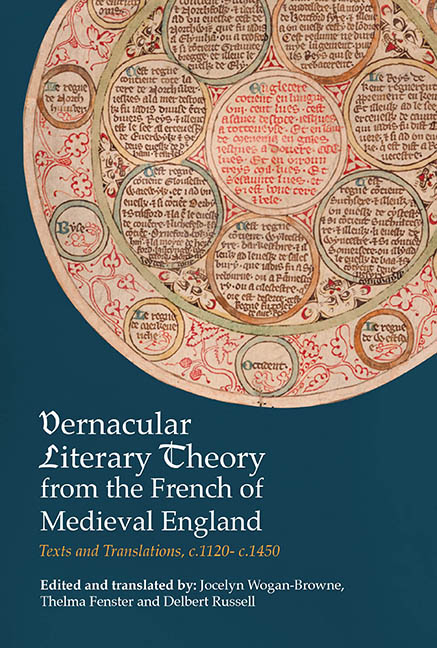 Vernacular Literary Theory from the French of Medieval England
Vernacular Literary Theory from the French of Medieval England Book contents
- Frontmatter
- Dedication
- Contents
- List of Maps and Illustrations
- Preface
- Abbreviations
- Map
- General Introduction
- Establishment of Texts and Translations and Conventions Used
- Part I Faus franceis and dreit engleis: On Language
- Part II Si sa dame ne li aidast: Authorship and the Patron
- Part III Primes dirrum la dreyte fei: The Conduct of Reading, Hearing and Seeing
- Part IV Ki veult oïr: Forming Audiences and Creating Textual Communities
- Part V Si come en latyn trovay escrit: The Lineage of the Text
- Postlude. Honneurs publiées … en divers royaumes
- Part VI Essays and Resources
- Timeline
- Glossary
- Bibliography
- General Index
- Index of Manuscripts
Postlude. Honneurs publiées … en divers royaumes
Published online by Cambridge University Press: 25 October 2017
- Frontmatter
- Dedication
- Contents
- List of Maps and Illustrations
- Preface
- Abbreviations
- Map
- General Introduction
- Establishment of Texts and Translations and Conventions Used
- Part I Faus franceis and dreit engleis: On Language
- Part II Si sa dame ne li aidast: Authorship and the Patron
- Part III Primes dirrum la dreyte fei: The Conduct of Reading, Hearing and Seeing
- Part IV Ki veult oïr: Forming Audiences and Creating Textual Communities
- Part V Si come en latyn trovay escrit: The Lineage of the Text
- Postlude. Honneurs publiées … en divers royaumes
- Part VI Essays and Resources
- Timeline
- Glossary
- Bibliography
- General Index
- Index of Manuscripts
Summary
Introduction
Like some of the language treatises (7a–e) and the Speculum ecclesie of St Edmund (22), our final excerpt, the Débat des hérauts (44) is a work with both manuscript and print lives. Composed in France in probably the mid-fifteenth century, the Débat provoked a riposte in English in 1549 from John Coke, Clerk of the Staple under Edward VI, who encountered it in Flanders (see Part VI, §2.10). The Débat is chosen here for its review of late-medieval and early-modern cultural traditions, shared, across a patchwork of regional differences, between several adjacent and interlinked cultures, England, France and Flanders. These cultural overlaps are in some respects continuous with those of twelfth-century England and Britain and the vigorous diffusion of Brut materials in and beyond insular culture. England and France are represented in the Débat as pulling apart into oppositional identities, a process that cannot help but testify to all that is common to them (in the excerpt here, principally traditions around Brutus, but around many more cultural figures and resources in the text as a whole). The Débat's imbrication of cultural traditions as between England and France can be compared with the A tous nobles genealogical roll of 1443 (20d). Here a version of the French royal genealogy is displayed, in order to assert superior English claims to the French throne through the female line, and the roll's account of continuity and succession reaches back behind Brutus to Albina.
It is important to resist teleology and not to see the Débat as an inevitable result of a developing sense of national identity, versions of which are invoked in varying ways on occasion in earlier literature. Socio-political communities in any case polarise identity around a variety of axes. Matthew Paris's thirteenth-century Life of St Edmund, archbishop of Canterbury (13) is an example where the focus is the realm and its access to the sacred, rather than the nation. Edmund died in France en route to Rome, and the Cistercians at Pontigny had the burying of his body, so that his cult is shared across the Channel.
- Type
- Chapter
- Information
- Vernacular Literary Theory from the French of Medieval EnglandTexts and Translations, c.1120- c.1450, pp. 388 - 400Publisher: Boydell & BrewerPrint publication year: 2016


